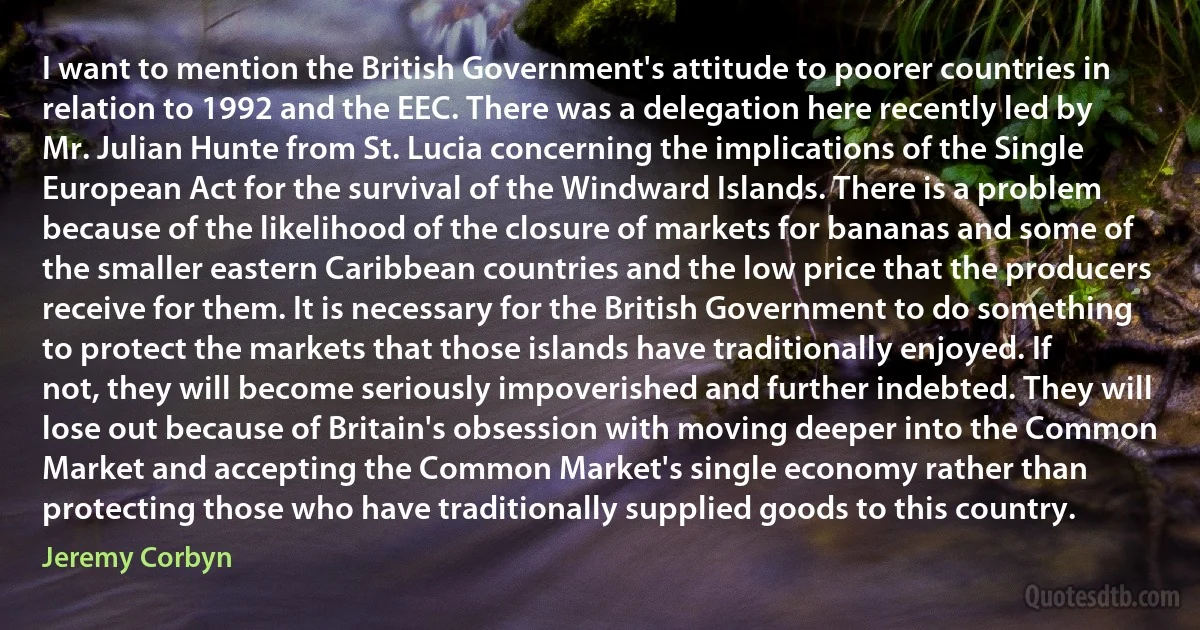
I want to mention the British Government's attitude to poorer countries in relation to 1992 and the EEC. There was a delegation here recently led by Mr. Julian Hunte from St. Lucia concerning the implications of the Single European Act for the survival of the Windward Islands. There is a problem because of the likelihood of the closure of markets for bananas and some of the smaller eastern Caribbean countries and the low price that the producers receive for them. It is necessary for the British Government to do something to protect the markets that those islands have traditionally enjoyed. If not, they will become seriously impoverished and further indebted. They will lose out because of Britain's obsession with moving deeper into the Common Market and accepting the Common Market's single economy rather than protecting those who have traditionally supplied goods to this country.
Jeremy CorbynRelated topics
act caribbean closure common country delegation goods government julian led likelihood lose low market mention moving necessary obsession price problem receive single something eecRelated quotes
The mulatto sons of white traders and the sons of African rulers were the ones who made the greatest effort to learn the white man's ways. This helped them to conduct business more efficiently. One Sierra Leone ruler in the eighteenth century explained that he wished "to learn book to be rogue as good as white man”; and there were many others who saw the practical advantages of literacy. However, the educational process also meant imbibing values which led to further African subjugation. One West African educated in this early period wrote a Ph. D. thesis in Latin justifying slavery. That was not surprising. The Reverend Thomas Thompson was the first European educator on the Gold Coast, and he wrote in 1778 a pamphlet entitled, The African Trade for Negro Slaves Shown to be Consistent with the Principles of Humanity and the Laws of Revealed Religion.

Walter Rodney
In a capitalist democracy there are essentially two methods by which social choices can be made: voting, typically used to make ‘political' decisions, and the market mechanism, typically used to make ‘economic' decisions. In the emerging democracies with mixed economic systems Great Britain, France, and Scandinavia, the same two modes of making social choices prevail, though more scope is given to the method of voting and to decisions based directly or indirectly on it and less to the rule of the price mechanism. Elsewhere in the world, and even in smaller social units within the democracies, the social decisions are sometimes made by single individuals or small groups and sometimes (more and more rarely in this modern world) by a widely encompassing set of traditional rules for making the social choice in any given situation, for example, a religious code.

Kenneth Arrow
Sir Michael Spicer: What are the characteristics of old Labour that he dislikes so much?
Tony Blair: I am afraid that the Hon. Gentleman will have to repeat that.
Sir Michael Spicer: What are the characteristics of old Labour that he dislikes so much?
Tony Blair: Basically, that it never won two successive terms of Government and, perhaps, that it never put the Conservative party flat on its back, which is where it is now. Thankfully, we are running an economy with low inflation, low mortgage rates and low unemployment; fortunately, we are doing a darn sight better than the Government of whom the right hon. Gentleman was a Member, who had-I thank him for allowing me to mention this-interest rates at 10 per cent. for four years, 3 million unemployed and two recessions. Whether it is old Labour or new Labour, it is a darn sight better than the Tories.

Tony Blair
My broad position remains firmly libertarian, sceptical of official cover-ups and uncompromisingly internationalist, believing sovereignty to be an almost total illusion in the modern world, although both expecting and welcoming the continuance of strong differences in national traditions and behaviour. I distrust the deification of the enterprise culture. I think there are more limitations to the wisdom of the market than were dreamt of in Mrs Thatcher's philosophy. I believe that levels of taxation on the prosperous, having been too high for many years (including my own period at the Treasury), are now too low for the provision of decent public services. And I think the privatisation of near monopolies is about as irrelevant as (and sometimes worse than) were the Labour Party's proposals for further nationalisation in the 1970s and early 1980s.

Roy Jenkins
What is the good, I ask, in the name of common sense, of prohibiting sweating in this country if you allow sweated goods to come in from foreign countries? If you insist on limitation, of hours and upon precautions for security, bear in mind all these things add to the cost of production, to the difficulties of the manufacturer in selling his goods, and unless you give him some increased price, some increased advantage in compensation, then he cannot carry on competition any longer. All these conditions in the long run will result not to your advantage, for you will have no work to do, but to the advantage of the foreigner, who is not so scrupulous and who conducts his work without any of these conditions...If protected labour is good, and I think in many ways it is...then it is good to protect the results of labour, and you cannot do one without the other.

Joseph Chamberlain
